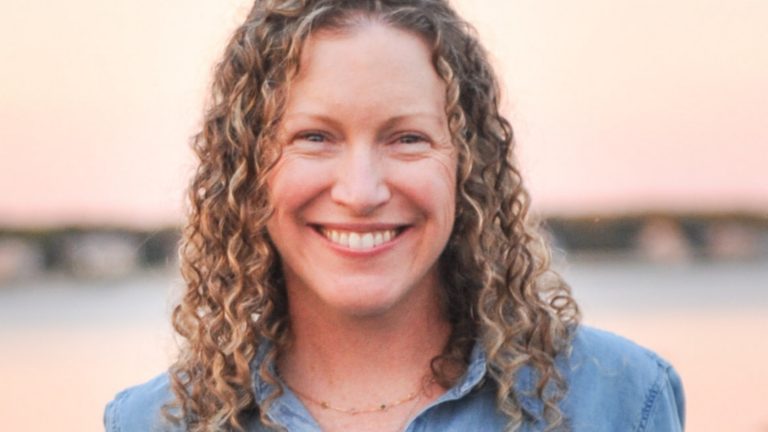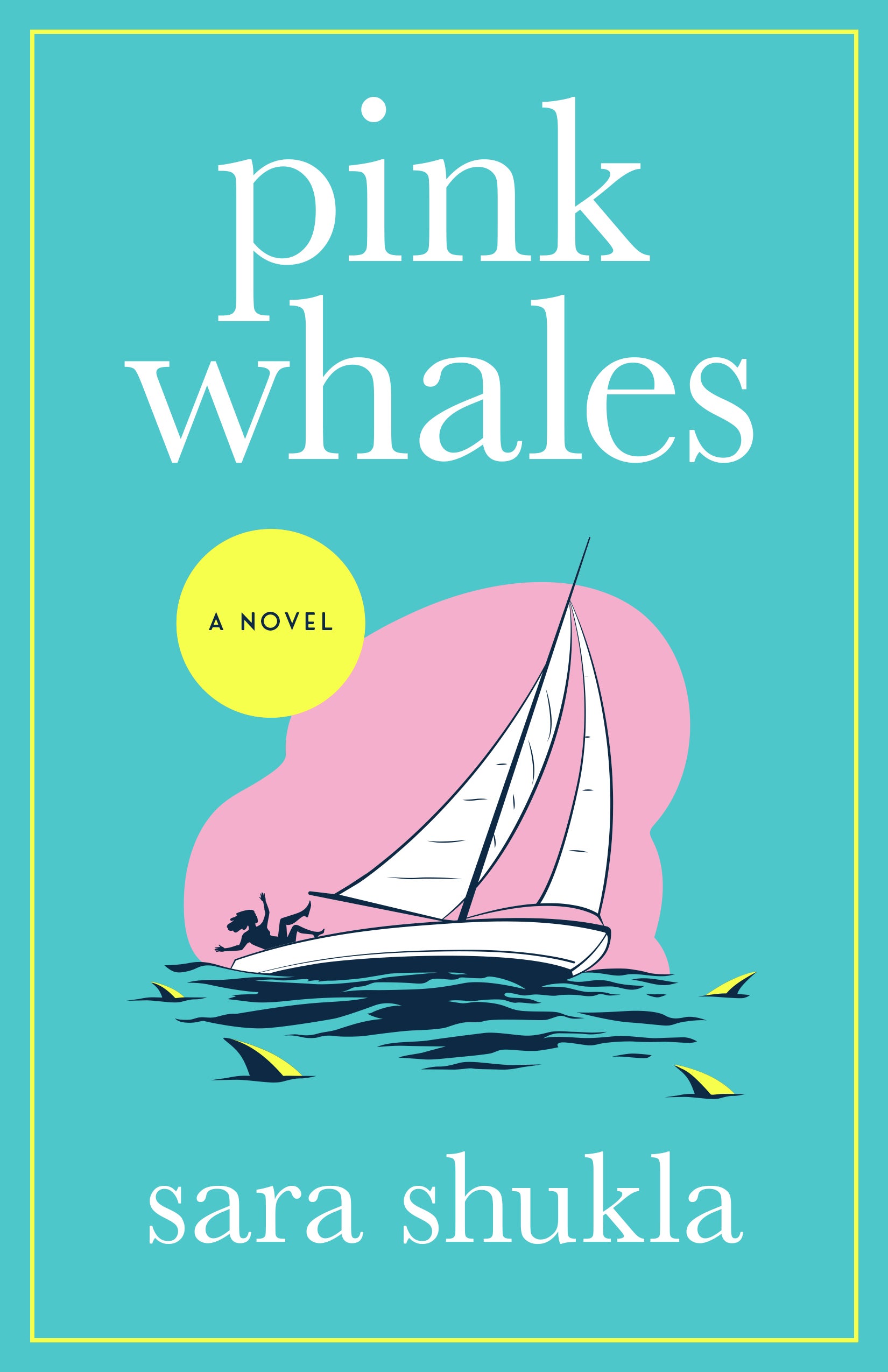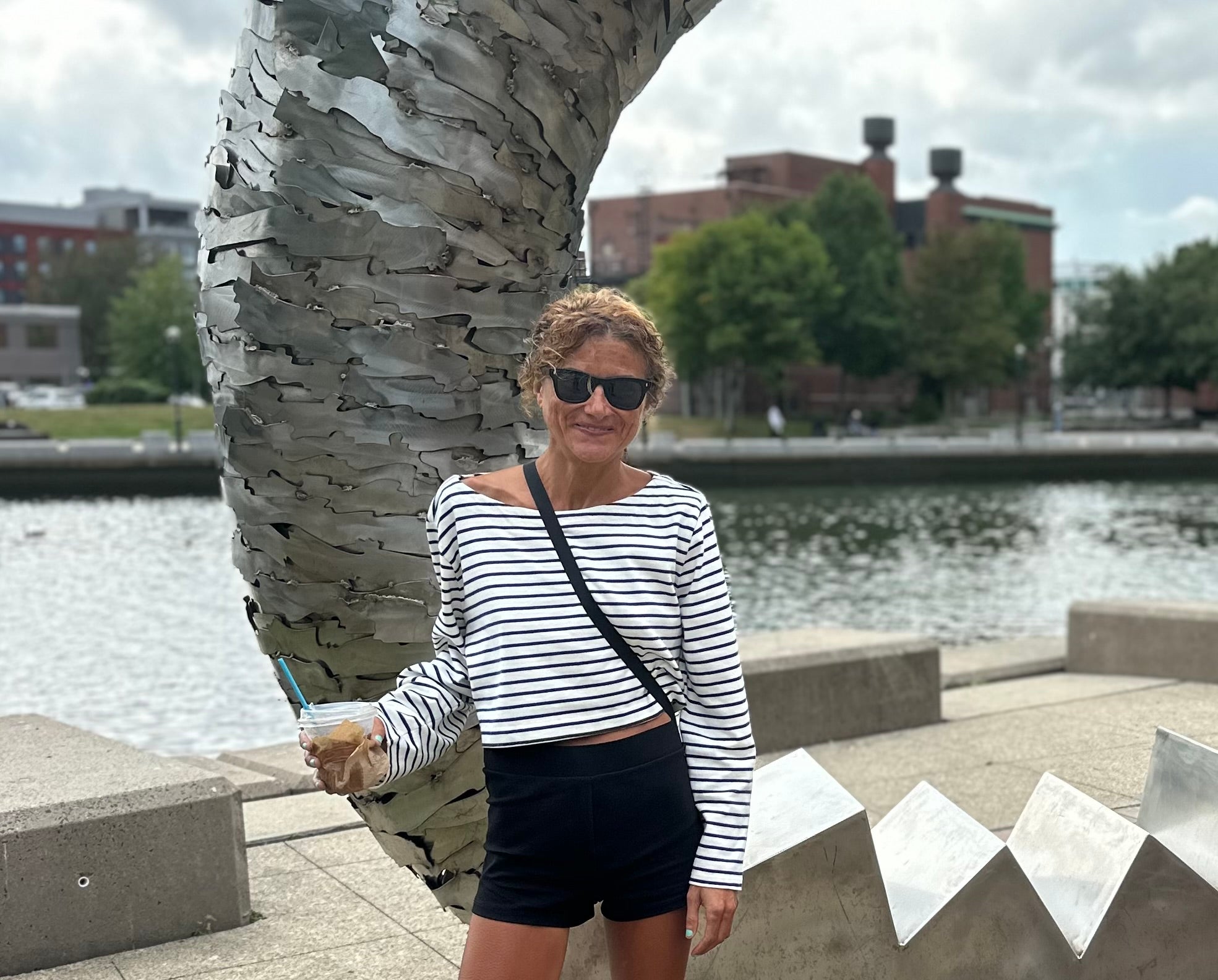Newsletter Signup
Stay up to date on all the latest news from Boston.com

By Lauren Daley
A beach read doesn’t just offer escape for the reader — it offers escape for the writer, too.
For Sara Shukla, writing a humorous Massachusetts-set beach read was escape — from the work of mothering three young kids during the pandemic, the stress of her husband working the frontlines at New Bedford’s St. Luke’s Hospital emergency room.
Working on “Pink Whales” (out now) was like “a little escape-hatch,” the WBUR editor told me in our recent phone interview from her Marion home.
Shukla tells me she relies on a quote from Mel Brooks: “If you laugh, you can get by.”
“I quote that to my kids every day. They roll their eyes but it’s one of my favorite sayings,” she says, adding that Brooks’s brand of comedy is “baked into who I am and how I approach life.”
Shukla, 44, wrote a piece for WBUR about how Brooks helps her cope in 2022. That same year, her husband Anil wrote a piece for WBUR about the stress of working in an ER.
She hopes her debut — a beach read as fluffy as a pool towel, with a framework Shukla likens to “Mean Girls” — will offer readers laughs: “I hope they find some escape. I hope they tear through it on the beach.”
The book’s nutshell: When Charlie, her doctor husband Dev, and their 6-year-old twins move to tony coastal Rumford, Massachusetts, Charlie feels adrift. The new town is awash with khaki, pastels, Yeti coolers, Lilly Pulitzer, “cranberry pants,” dock shoes. It’s yacht club yuppyville, and Charlie is desperate to fit in. When a trio of Rumford moms show her attention, she latches to their clique and all but oozes a need for social acceptance.

She drags the worked-to-the-bone Dev to yacht club parties and sailing trips with moneyed neighbors. She’s paranoid that Dev is cheating with his old flame/ clinic co-worker. She’s kinda sorta crushing on the hot townie carpenter.
Charlie clearly needs to grow up — and other characters tell her that. But readers can understand where she’s coming from. Pregnant with twins in her 20s, after a few dates (“One day I was smoking weed with the dishwasher guys after my lunch shift, the next I was staring at a pregnancy test”) she marries the babies-daddy — a doctor she placed on “a pedestal so high, there was no possible way I could join him on it.”
She’s 31 when she lands in Rumford: a land of tennis clubs, wine cellars, private beach cabanas. She’s unsure of Dev’s love, unsure of how she fits in. While Charlie is worried about how to dress to impress local moms, Dev works in an underfunded clinic in nearby Bradley “a handful of miles and seemingly worlds away…The faded, grubby buildings, the craggy sidewalks… Some buildings looked outright abandoned, the windows boarded up.”
There’s a storyline about the opioid epidemic threaded through. But largely, “Pink Whales” is a humorous, coming-of-age story for adults. While Shukla likened the book to Tina Fey’s “Mean Girls,” Charlie reminded me of Tina Fey as Liz Lemon in “30 Rock” in her social awkwardness and overall vibe.
I called Shukla — ahead of readings June 27 in Marion and July 23 in Warren, R.I. — for a wide-ranging interview: from the recent loss of her father to the inherent optimism of writing.
Shukla: The origin story is just me being awkward at parties. It’s fiction— this is not about me. It’s funny. We moved to Marion, and it was the first time I lived any place where I felt: “I don’t think I got the memo.” I’d show up someplace in a flannel like: “Oh. I’m the only one here that looks like this.” It struck me as funny. I’ve always liked insider/outsider novels. Rumford is definitely made up, but everybody I’ve talked to is like: “Is it this place? Is it that?”
I’m hoping it hits on a lot of towns.
It’s Massachusetts. The first time I read the review I was so out of my body — “I got a review from Kirkus!” —that I [didn’t even catch that.] But they said such nice things otherwise, that they can call it Maine.
I started writing when we were new to Rhode Island, so I probably thought, “Oh, this doesn’t have any association for me. If this ever becomes anything, I’ll change it.” But my editors said, “No, we like it. Just keep it.”
My husband took a job in the ER at St Luke’s Hospital in New Bedford. We lived here for a couple years, then moved to Barrington, Rhode Island, where I started writing. Because of the commute, Anil actually lived on our boat in Marion for 10 weeks. That was the first story I wrote for WBUR in 2020. Later I ended up hopping the fence and becoming an editor there.
It’s a funny line to tread. I definitely pulled from broader things I noticed. As a new person, you notice things that maybe have always been there, but feel more jarring to you. I felt surprised that you could be in one place, then go a couple miles over, and it’s a very different place.
Probably when we moved to Barrington. I was at home with my third baby, around 2018. I thought: “I need to do something.” I wanted to explore fiction. I’d always written essays and nonfiction. I took some classes in Providence with Annie Hartnett.
After about 18 months, I applied to Novel Incubator at GrubStreet in Boston. It was a wonderful, legitimizing, community-focused experience. After that, I had an actual novel to query, and eventually a book deal.
I think I did. I started with the relationship, because I wanted to explore two people [Charlie and Dev] on separate tracks. Not to go from opioid addiction to rom-com, but I wanted it to be a rom-com-adjacent thing, where you’re like, “Are these people going to get back together or not?” I thought: “What factors are keeping them apart? Making their experiences different?” Moving up here, seeing how the opioid epidemic touches on every class and community in different ways, I thought that was something to explore.
[laughs] Yeah. I tried to have a tension with the two main characters where you’re rooting for them to eventually find their way back to each other, but they both have to grow up a little bit.
At the Novel Incubator, we started to talk about it like “ Mean Girls” and I thought, “That’s a great framework.” That gave me a structure to put this loose story into. It was fun to think of a grown-up, yacht club, “Mean Girls.” It gave me the freedom to make it not quite based in reality, and just have fun with it.
Those are just things I thought were funny. Small details kept me laughing.
I must’ve seen a Vineyard Vines catalog, I was probably thinking of the iconic pink whale. But it’s not affiliated. They haven’t sponsored me, or offered to have me in their catalog or anything — it would be fine if they did.
But the more I thought about it: whales are huge. Big and scary and powerful and majestic. And we make them really small, and make them smile on pants and shirts.
No. We belong to a yacht club here, and I find it pretty relaxed. If these parties are happening, I’m not invited to them. I’d love it if somebody read it and said, “Oh yeah, I went to one like this.” I’ve not been invited to them. So I guess I’m not trying as hard as Charlie.
I wanted to have a narrator who was sort of bumbly and messy and not together. I thought, “Let me make the kid really functional and into survivalism.” I thought it would be funny if the kid is a spoil to the mom, who ultimately has to figure out how to survive herself.
Humor has always been a passion. Not to take it to the non-humorous, but my dad just died two weeks before my novel published. Sorry, I didn’t expect to [talk about this.]
Thank you. He was one of the funniest people. I grew up watching “Get Smart,” and Mel Brooks movies with him. The humor is what made me want to keep working on it. I actually just listened to this interview with Jack Antonoff on NPR. I’ve been thinking about it lately, grieving over my dad. He said: Songwriting is inherently an act of optimism. You never know if anybody’s going to listen. It can be the saddest song, but the act of writing it is optimistic, because there’s no guarantee that it’ll be out there.
Writing is like that, too. You’re saying: “I think this creative thing I’m putting my time and energy into is going to be out in the world.”
I do. After the Novel Incubator, we’d go to this Irish bar, and rec softball teams from Boston Common came in. I remember during the pandemic, being at home with my kids like: “I just want to be on a co-ed rec softball team. I want to be part of that group, and have a drink afterwards.”
Yeah. More of a straight-up rom-com with a softball team. I could escape into that.
Learn more and see event info here.Lauren Daley is a freelance writer. She can be reached at [email protected]. She tweets @laurendaley1, and Instagrams at @laurendaley1. Read more stories on Facebook here.

Lauren Daley is a longtime culture journalist. As a regular contributor to Boston.com, she interviews A-list musicians, actors, authors and other major artists.
Stay up to date on all the latest news from Boston.com
Stay up to date with everything Boston. Receive the latest news and breaking updates, straight from our newsroom to your inbox.
Conversation
This discussion has ended. Please join elsewhere on Boston.com